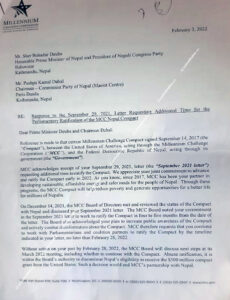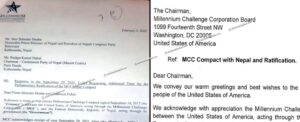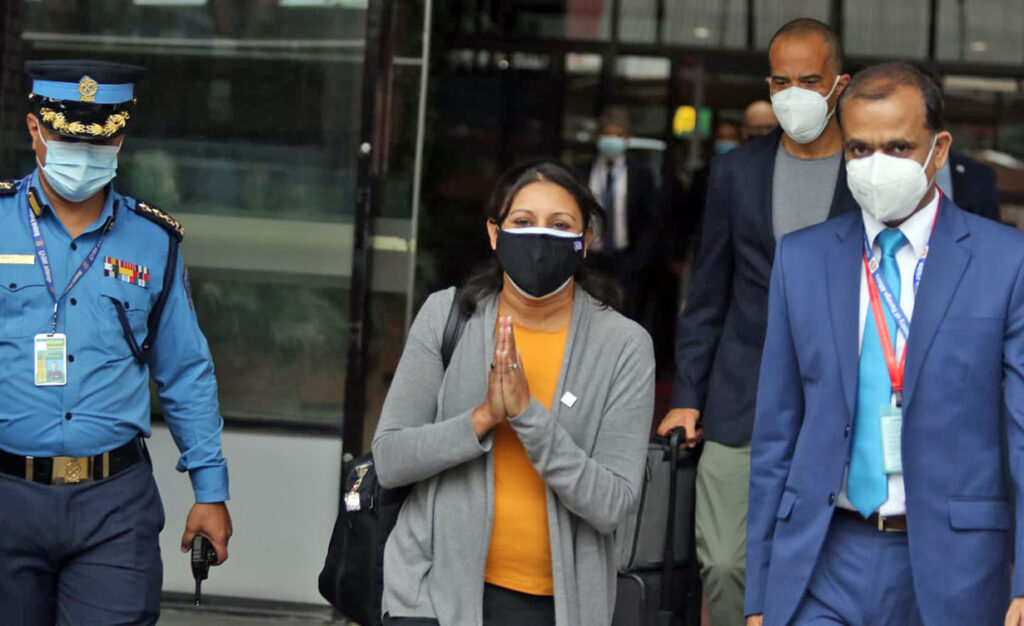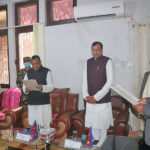Kathmandu, February 6
The United States has given the Government of Nepal a deadline to approve the Millennium
Challenge Corporation (MCC) project in Parliament by February 28.
While there are sharp differences within the ruling coalition over the implementation of MCC in Nepal, the United States has written to the MCC to get the approval from the parliament by March 31.


In a letter to Nepal on February 3, the acting chief executive officer of the US government’s aid project MCC made it clear that the United States could not wait long for the implementation of the MCC agreement.
He has sent a joint letter to Prime Minister Sher Bahadur Deuba and another leader of the
ruling coalition, CPN-Maoist Central Committee Chairman Pushpa Kamal Dahal ‘Prachanda’ asking them to reach a quick decision on the implementation of MCC.
The letter sent by the MCC was sought to be kept secret by the government. The letter has not been made public even among the ruling coalition parties. According to a letter received by Online News, the United States has made it clear that the MCC must be approved by parliament by February.
On 13 Asoj (September 29), Prime Minister Deuba and UCPN (M) Central Chairman Prachanda sent a letter to the MCC Board asking for four to five months for approval from the MCC Parliament. In the letter, the two leaders pledged to hold positive discussions with the ruling coalition parties in favor of the MCC within five months and create an environment for MCC approval. Appreciating the commitment of the two leaders to create a positive atmosphere at the grassroots level about the MCC, the MCC said it was time for Parliament to approve it.
In response to the letter of Deuba and Prachanda, the MCC board informed that the time has been provided as requested and the MCC has fixed the time for approval from the parliament. ”We urge you (Deuba and Prachanda) to start working with the parliamentarians and the leaders of the ruling coalition to get the MCC approval from the parliament as soon as possible, not later than February 28, 2022,” the letter said.
The letter does not explicitly mention the withdrawal without the approval of the MCC
Parliament on the scheduled date, but states that the MCC Board, which will meet on March
22, will discuss the agreement with Nepal. ”After that, we will discuss the next phase in the board,” the letter said. The MCC board has the authority to finalize the 500 million project that Nepal will receive. In that case, the MCC agreement with Nepal will be terminated. ‘
US officials in Nepal also claim that the five-month deadline has been extended as per the
demand of Nepal’s leaders and that Nepal will lose the MCC project if it does not get the approval of the parliament. The MCC also said that the continuation of the agreement was a sovereign decision of Nepal.
In the second week of September last year, a delegation led by MCC Board Vice President
Fatima Sumar had visited Nepal. The team met with senior government officials as well as top leaders of major political parties to discuss the implementation of the MCC project. In a
meeting with MCC Board Vice-Chairman Sumar, Prime Minister Deuba had asked for some
time, expressing his commitment to get approval from the MCC Parliament.
The MCC board has sent a joint letter to both the leaders on the eve of the five-month deadline demanded by Prime Minister Deuba and Prachanda. ”We reviewed the status of the MCC agreement and discussed your letter at the MCC Board meeting on December 14, 2021,” the letter said. ”We are pleased with your joint commitment to ratify the MCC.” We are happy to seek consensus in all political parties and remind the general public. ‘
Nepal and the United States signed an agreement on the MCC project five years ago. The
project, which should have been implemented in five years, has not started yet in Nepal.
Nepal’s political parties are divided over the MCC project, and public opinion is divided. The parties have not reached a decision as the MCC project is politically divisive.
While there are signs of increasing polarization in Nepal’s political parties over the future of the MCC, the United States has pressured Nepal to speed up the implementation of the MCC project. The government has also come under pressure after the United States sent a letter signaling its withdrawal within a month if the MCC is not implemented. Prime Minister Deuba has been proposing in the meeting of the coalition that there should be no delay in ratifying the MCC, but the Maoist Center and the CPN-Unified Socialists in the alliance are in favor of not ratifying the MCC in the status quo.
The MCC agreement registered in the parliament three years ago by the government led by
CPN-UML chairperson KP Sharma Oli is in a state of limbo as the speaker has not taken it
forward. Prime Minister Deuba is in favor of the agreement being submitted to the parliament and its implementation. However, Agni Prasad Sapkota, who became the speaker from the Maoist center, did not want to take MCC forward in the parliament. Due to which, some people are worried about going through MCC process.
Status of MCC project
An agreement was reached between the Government of Nepal and the United States on 14
September 2017 on the MCC project. In the year 2068, Dr. When Baburam Bhattarai was the Prime Minister and Barshaman was the finance minister again, Nepal was selected for the MCC threshold. Immediately, the Joint Secretary for Foreign Aid of the Ministry of Finance was appointed as the liaison person to coordinate with the MCC. An expert group was formed in the government led by Khil Raj Regmi and Nepal was selected for the MCC project in Magh when Sushil Koirala was the Prime Minister.
An agreement was reached in 2073 BS to accept technology grant for drafting MCC Compact. At that time, KP Sharma Oli was the Prime Minister and Vishnu Poudel was the finance minister.
The government had formed a negotiating team to reach an agreement with the MCC in Jestha 2074 BS. At that time, the prime minister was Prachanda and the finance minister was Krishna Bahadur Mahara.
The MCC Compact Agreement was signed on Bhadra 29, 2074. Finance Minister Gyanendra
Bahadur Karki of the Deuba-led government has signed the agreement.
An expert group formed by the Khil Raj Regmi-led government to select the project investment area had identified four main areas. In which the areas of electricity, road infrastructure, policy continuity and labor problem were pointed out. Out of the four, electricity and road infrastructure projects have been selected.
The agreement stipulates that the US government will invest US 500 million (approximately Rs 60 billion) and the Nepali government US 130 million in projects under the MCC.
Under the project, a 400 kV transmission line will run from Lapsiphedi in Kathmandu through Ratmate in Nuwakot to Damauli in Tanahu and from there to Butwal in Rupandehi. The project aims to extend the same transmission line to Gorakhpur, India.
Similarly, another transmission line will be connected to Dhalkebar-Duhabi transmission line
from Ratmate of Nuwakot via Hetauda of Makwanpur. In addition, as per the MCC agreement, high level maintenance work will be carried out on five different road sections along the transmission line (Sourced from Online Khabar).
By Karuna Thapa




